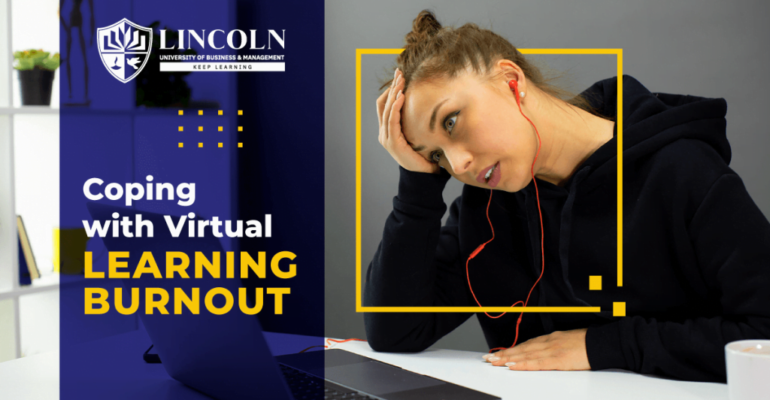Coping with Virtual Learning Burnout
October 11, 2021 2024-03-07 13:07Coping with Virtual Learning Burnout
At a time when we were just becoming conscious about the effects of continuously staring at screens on our mental health, the pandemic hit us. And digital screens became our only savior. Be it for work, education, or personal reasons, we became totally dependent on virtual screens. And after 1 and half years into the pandemic, it has shown its effect. Virtual learning burnout is a new reality and we are all falling prey to it.
Table of Content:
- Introduction
- What is ‘virtual learning burnout’?
- What causes Virtual Learning Burnout?
- It’s not just a ‘phase’
- How to overcome Virtual Learning Burnout?
- Reach out to friends and family
- Take time out for yourself
- Maintain a healthy lifestyle
- Keep everything organized
- Don’t overburden yourself
- Take breaks in between
- Check-in with yourself
- Get professional help if needed
- In Conclusion
What is ‘virtual learning burnout’?
The textbook definition of burnout is a state of mind which is reached under chronic stress and exhaustion. It is characterized by cynicism, emotional exhaustion, and ineffectiveness to function rationally. Although burnout isn’t exactly a mental illness, it is a mental health issue. And if not taken seriously and treated with care on time, it can cause severe damage.
Initially, burnout was seen among working professionals or students due to excessive study or work pressure. But with everything shifting online, this recent phenomenon called ‘virtual burnout’ came into existence. Being confined to our homes, and excessive exposure to screens with little or no time to relax, is the root cause of virtual burnout.
Other than the feeling of ‘just can’t do it’, the following are also symptoms of a virtual learning burnout:
- Losing self-confidence
- Low motivation most of the time
- Disturbance in sleep schedule
- Chronic fatigue
- Low concentration
- Constant feeling of frustration, pressure, and bored
What causes Virtual Learning Burnout?
The uncertainty of the past year has taken its toll on all of us, whether you are a student or a working professional. The chronic stress from continuously sitting in front of screens is the root cause of virtual burnout. A professor from Kansas University found out in research that virtual learning requires more mental processing than face-to-face interactions. The same study also states that virtual learning demands more energy and induces more stress than any other medium, like phone calls or email.
It’s not just a ‘phase’
Even though in recent times, the discussion about mental health has changed a lot, despite that, the stigma exists. We as a society are yet to come to terms with the fact that mental health is as important as physical health. Our minds, just like our bodies, need rest to recover from exhaustion. So if someone tells you that your virtual burnout is just a phase that will pass, don’t believe them. Virtual burnout is as real as a headache or fever. And you need the right medicine or course of treatment to cure it.
How to overcome Virtual Learning Burnout?
If you can relate to any of the above-mentioned symptoms, then it’s time to take action. There are few simple steps that you can take to deal with virtual burnout. This mental health issue is mainly stress-induced. Therefore, dealing with virtual burnout primary involves reducing stress.
Here is a list of easy ways to reduce your stress and reverse your virtual learning burnout:
Reach out to friends and family
There is a common saying, “Friends are the best medicine”. And it holds true sometimes. Especially when dealing with stress. A simple heart-to-heart talk with your friend or a family member can help in several ways. A fun-filled planned day out may even work wonders.
Take time out for yourself
Amid taking care of everything, we often forget to take care of the most important person in our lives, ourselves. Take some time out for yourself. Indulge in your favorite childhood hobby. In case you don’t have one, try looking for one. It can also be something as simple as going out for a meal or re-watching your favorite movie. Whatever makes you feel good, go and do it.
Maintain a healthy lifestyle
We just can’t stress enough about the benefits of having a healthy lifestyle. Eating healthy, exercising regularly, and getting enough sleep helps you to maintain good physical as well as mental health. It’s very common to get lured into eating a high-fat or sugary treat, but try to avoid it. It may give you a feel-good moment, but it’s not good for the long run. Sure, the occasional treat is okay. But don’t make it a regular thing. The same goes for exercise. Your busy schedule may not allow you to exercise regularly. But even a 10-minute walk can be helpful. So try to release those endorphins in any way you can.
Keep everything organized
In your busy schedule, maintaining a schedule will help you be on top of things. It may require some extra work to create a proper schedule, but it’s worth it. Without a proper organizational system, you may fall behind, inducing further stress. Your assignments and projects may seem a lot, but if you break them down into smaller tasks, they will be done in no time. It will take some time for you to master the organizational and time management skills, but once you do, your life will be much easier.
Don’t overburden yourself
It might be tempting to take that extra class to increase one more skill, but now might not be the right time. You can use that time to do your workout. Or anything that might hello you deal with all the stress. After we are still recovering from a pandemic. It’s absolutely okay to cut yourself some slack.
Take breaks in between
It is absolutely necessary to take breaks to keep your stress in check. It might not always be possible to take a proper break, but you can certainly make smaller ones. Get up from the chair, get away from the screen, make yourself a strong cup of coffee, stretch a bit. You can even try changing your environment for a day. Go sit in a cafe or a library and get your work done from there. You can also try calling up a friend and work with them while chit-chatting in between.
Check-in with yourself
Often we realize the effect of stress when it’s too late. Don’t let that happen. Take some time out, sit and check in and see how you are feeling. Doing this regularly will help you recognize stress early. Which in turn will help you prevent virtual learning burnout.
Get professional help if needed
Even on today’s date, a certain amount of stigma regarding therapy still exists. But it’s time that we end this stigma. There is absolutely no shame in going for therapy. It is as normal as going to a doctor when you are not physically well. So if you are having symptoms of virtual learning burnout, do go and see a therapist. You can also check in with your university counselor. They will equip you with the right tools to deal with your stress.
In Conclusion,
With the kind of busy lifestyles we live, stress has become a very common phenomenon. But that doesn’t reduce the seriousness of it. Apart from short-term effects like virtual learning burnout, it can also have serious long-term effects on both your mental and physical health. Therefore, take action before it’s too late.
If a busy schedule is stopping you from getting your online degree, we are your answer. We at LUBM offer flexible internationally accredited bachelor’s, master’s, and diploma programs that are perfect for working professionals. Visit our page to know more.
You can also try talking to our expert counselor to get the answers to all your queries.






